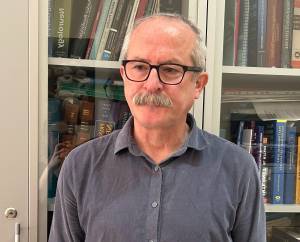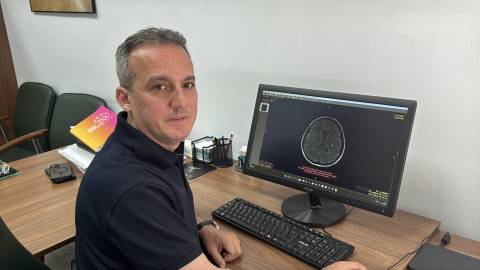Forgetfulness Is Not Always Innocent: Take the Signs of Dementia Seriously
Prof. Dr. Hüseyin Alparslan Şahin, a faculty member at the Department of Neurology at Ondokuz Mayıs University (OMU) Faculty of Medicine, emphasized that forgetfulness—particularly in older adults—should not be regarded as normal, warning that it could be an early sign of dementia.
“Everyone may forget small things from time to time, and this usually doesn’t negatively affect daily life. However, if forgetfulness starts to lower one’s quality of life or is noticed and pointed out by others, it is essential to consult a physician without delay,” Prof. Dr. Şahin said.
Uzun yıllardır demans, Alzheimer ve Parkinson hastalıkları üzerine çalışmalar yürüttüğünü belirten Prof. Dr. Şahin, yaşlılıkla birlikte gelen unutkanlığın toplumda doğal bir süreç gibi görülmesinin yanlış bir algı olduğunu söyledi.
Having conducted research on dementia, Alzheimer’s, and Parkinson’s diseases for many years, Prof. Dr. Şahin noted that the perception of memory loss as a natural part of aging is a widespread misconception.
“The belief that elderly people naturally develop dementia exists in many societies”
“This belief, though somewhat reduced thanks to the efforts of Alzheimer’s associations in recent years, still persists,” he noted.
“Medications Must Be Used for Life”
One of the biggest challenges for dementia patients, according to Prof. Dr. Şahin, is medication noncompliance. He stated that many patients either do not start their prescribed treatments at all or stop taking them shortly after beginning.
“These medications must be used for life. Unfortunately, only 30 to 40 percent of diagnosed patients take their medication regularly,” he said.
Lifestyle Suggestions for Reducing Alzheimer’s Risk
Although there is currently no way to prevent Alzheimer’s disease entirely, Prof. Dr. Şahin explained that certain lifestyle habits may help reduce the risk.
“Being socially active, eating a healthy diet, reading, writing, and engaging in hobbies are all protective factors. Proper management of chronic diseases such as hypertension and diabetes can also help alleviate symptoms,” he said.
New Medications Offer Hope—but Effects Remain Limited
Prof. Dr. Şahin noted that several medications have been used in Alzheimer’s treatment since the early 2000s, and drew attention to two newly approved drugs by the U.S. Food and Drug Administration (FDA).
“These new drugs were developed to target the disease’s pathophysiology. While effective in animal studies, they have not yielded the same results in humans, with an efficacy rate of only around 30 percent. Moreover, they are costly. One company has applied to introduce them in Turkey, and the outcome is still pending,” he stated.
“An Active Lifestyle Protects the Brain”
Highlighting the benefits of an active lifestyle, Prof. Dr. Şahin recommended the following:
“Eating foods low in cholesterol, following a Mediterranean diet, exercising, and participating in social activities are all beneficial for brain and heart health. These habits are more effective if started at an early age. Beginning in one’s 60s or 70s may be too late. Embracing this lifestyle from a young age provides better protection.”
He also warned about the use of dietary supplements, stating, “There is no strong scientific evidence that substances like omega-3, ginkgo biloba, walnuts, or certain spices are effective against Alzheimer’s. They’ve been tested on thousands of individuals, but no significant benefit has been proven.”
“Genetic Predisposition Increases Risk”
While not every case of forgetfulness indicates dementia, it should still be evaluated, Prof. Dr. Şahin said, and added that genetics also plays a role:
“The rate of genetic transmission is about 3–5 percent. However, individuals with a family history of Alzheimer’s—especially first-degree relatives—have double the risk of developing the disease.”
“Seek Medical Advice if Forgetfulness Affects Daily Life”
Prof. Dr. Şahin concluded:
“Chronic sleep deprivation, poor diet, smoking, and alcohol consumption do not directly cause dementia, but they significantly increase the risk. Therefore, any form of forgetfulness that affects one’s quality of life should be promptly assessed by a physician.”


















